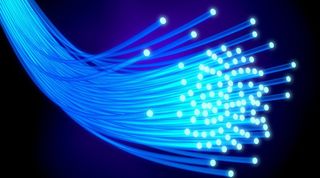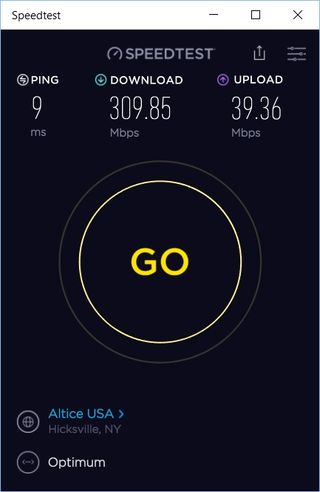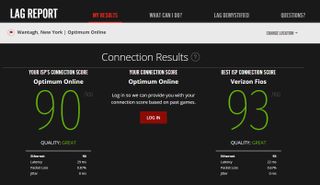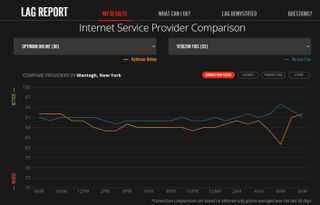Is a fiber connection really better than cable for gaming?
The short answer is 'usually'—here's why, and how to test your connection to make sure you've got the best one available.

The debate has gone on for over a decade at this point: whether a fiber-based optical internet connection is best for gaming, or if linking up with ol’ fashioned copper is just as good. For almost half of the folks in the US, the argument may be meaningless, as they still can’t choose their internet service provider if they want a broadband connection (defined as a modest >25 Mbps download, and >3 Mbps upload, per the FCC). But at least in the most recent data, approximately 54 million US households did have a choice between two broadband providers, and a lucky 7 million actually had access to three providers.
On the cable side of things, we have an aging copper infrastructure based on coaxial wires and amplifiers to propagate the signal across distances, with the speed of data transmission through a copper wire being about two-thirds the speed of light in a vacuum. Cable throughput speeds have traditionally been lower than fiber options, although DOCSIS 3.0 enables 1 Gbps download speeds (but this is not a symmetrical connection as the upload speeds max out at 100 Mbps), and its followup standard DOCSIS 3.1 promises even faster 10 Gbps speeds. Both are still being deployed and are not fully available.
Looking at this question solely in terms of bandwidth, fiber connections are currently superior, as in most cases they offer a fatter pipe for download as well as uploads.
The optical fiber side is the newer technology, with the data carried via pulses of light through pipes made of glass. To avoid confusion, know that cable carriers these days have a fiber optic backbone, and use the coax for their 'last mile solution,' that is, the cable that actually reaches your residence, whereas 'fiber internet' means the fiber goes all the way to your residence.
While it would seem that data would travel faster through fiber, the refractive properties of the glass slow things down, and it really travels about 31% slower than through air, so the speed of these photons is quite comparable to electrons in a coax cable. There's less need for amplifiers, though, as the data-carrying photons can propagate further than electrical-based connections that have to deal with the resistance of the wire.
While cable could catch up, fiber leapfrogged it and so generally offers faster speeds due to its more modern and recently deployed infrastructure. Some better ones, such as Google Fiber, offer a 1 Gbps symmetrical connection.
Looking at this question solely in terms of bandwidth, then, fiber connections are currently superior, as in most cases they offer a fatter pipe for download as well as uploads. As far as gaming goes, that simply means you'll be able to download games faster.

When it comes to online multiplayer, however, it's not really about bandwidth, as gaming uses a small amount of bandwidth, typically <1 Mbps. Instead, a good gaming experience depends on the constant and uninterrupted flow of data. It's about quality rather than quantity.
The biggest gaming news, reviews and hardware deals
Keep up to date with the most important stories and the best deals, as picked by the PC Gamer team.
The question of quality is harder to answer as ISPs are not going to admit to a subpar connection or aging infrastructure. But we can find the better connection if we look at metrics other than the bandwidth, including latency, which measures the time required for a signal to go from a transmitter to a receiver, and jitter, which quantifies the differences in packet arrival over time.
ISPs do not advertise their latency and jitter, but PCMag’s data set from late 2016 does provide some insight into this. When they added latency and jitter scores together to create a 'quality score,' their top three providers (EPB, Verizon Fios, and Google Fiber) all used fiber technology, although some cable providers did make their top ten. This makes sense, again because fiber has a newer infrastructure with fewer amplifiers, and because it's less prone to the interference that plagues copper wiring.

Another tool to measure the quality of a connection is the Lag Report. This useful site determines your current connection (Optimum Online in the screenshot above on the left side), and puts the alternate connection for your area to the right. A score above a 90 is considered 'Great,' and these measurements are based on latency, packet loss and jitter on Ethernet-connected games of League of Legends over the last 30 days. Here we can see confirmation that while the cable provider does offer a decent connection, the fiber competitor, Verizon Fios, offers lower latency, with less packet loss, although the same jitter. The Lag Report can also show the data throughout the day.

The answer to the cable vs fiber debate is that, in general, fiber connections are better for gaming as they offer faster downloads and a higher-quality connection with lower latency and jitter. That being said, do your homework with the tools mentioned above to find the highest quality ISP for the best gaming experience in your location.
Most Popular


